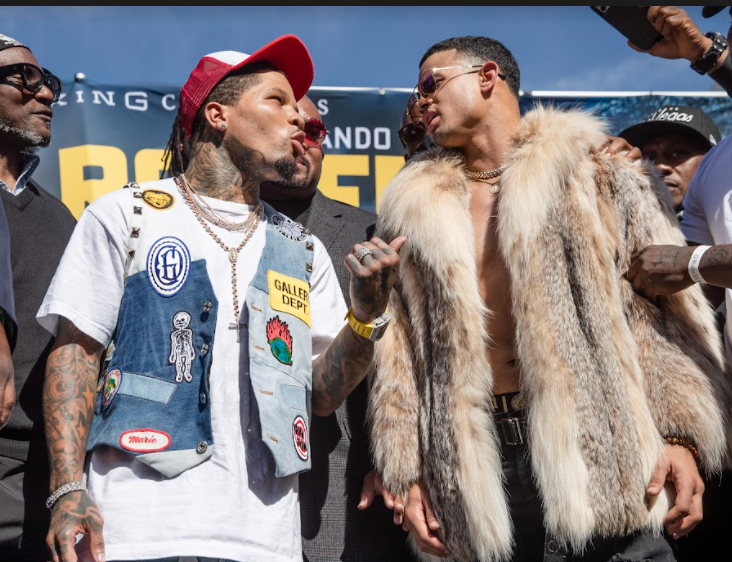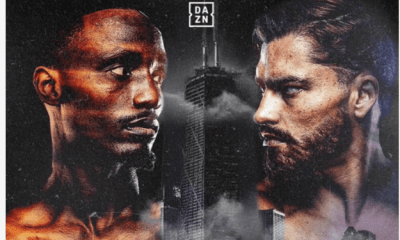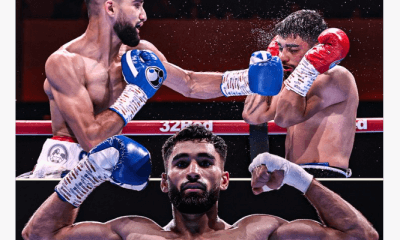Featured Articles
Avila Perspective, Chap: 157: Tank Davis and Rollie Romero in LA and More

Avila Perspective, Chap: 157: Tank Davis and Rollie Romero in LA and More
LOS ANGELES-One champ sells out Atlanta, the other fights out of Las Vegas, so I guess they will meet in the peace-loving neutral site of Los Angeles.
Gervonta “Tank” Davis holds the WBA lightweight title and the no-neck destroyer from Maryland who sells out in the city of Atlanta has agreed to fight in L.A.
Rollie Romero the number one brutish contender for the WBA title and native to the casino capital has also agreed to transplant this title match.
Tickets sales opened today.
Davis (25-0, 24 KOs) will defend the WBA lightweight belt against Romero (14-0, 12 KOs) on Dec. 5, at the Staples Center in Los Angeles. Showtime pay-per-view will televise the match that many predict will not hear the final bell.
One more thing, these guys absolutely do not like each other.
“We were supposed to spar in 2018 and he didn’t show up to the gym. He did that twice because he knew he was getting beat,” said Romero on his reason for having a beef with Davis. “He’s got such a big head, it’s going to be hard to miss it. He gets touched up by every opponent he faces. Leo Santa Cruz was beating him up and (Mario) Barrios was getting to him too.”
Davis said he does not care about words.
“He’s been talking for a long time. He’s trying to sell a fight, but I’m going to show him that he’s a chump on December 5,” said Davis. “I’m not here to talk, I’m here to fight. I don’t take this personally. To me, this isn’t a beef, this is business.”
Both expect a knockout, nothing less.
Even their promoter Floyd Mayweather agrees with that assessment.
“I don’t see this fight going the distance. Two undefeated knockout artists. Two champions,” said Mayweather.
Thompson Boxing Open for Fans
Fans return to the Inland Empire area this Friday, Oct. 22, with Thompson Boxing Promotions staging a fight card featuring undefeated super bantamweights at the Ontario Doubletree Hotel in Ontario, California.
The main event pits Northern California’s Eros Correa (10-0, 7 KOs) against Japan’s Katsuma Akitsugi (6-0). It can be seen on the Thompson Boxing Promotions page on Facebook.com.
“Thompson Boxing has had a lot of great fighters ascend to bigtime fights and I want to follow in their footsteps,” said Akitsugi who trains in Southern California. “They do a lot of shows in the L.A.-area, and they have helped my career a ton. I’m looking forward to putting on a great fight for the fans.”
It’s been almost two years since fans in the Inland Empire (the I.E. as locals call it) were able to attend a boxing card live. It’s significant because outside of Fantasy Springs Casino, on one occasion, people could not see boxing in-person.
Roughly there are about 15 boxing gyms in the I.E. including Joel Diaz and Antonio Diaz’s gym in Indio, the Robert Garcia Boxing Academy in Riverside, Abel Sanchez’s gym in Big Bear Lake, and the Henry Ramirez boxing gym in Riverside. Those are powerhouse gyms.
Ramirez has one of his fighters Anthony Chavez on the Thompson Boxing card this Friday.
The Inland Empire just may be the center of the boxing universe. This is not an exaggeration. One of the best discoverers of talent in the area has been Thompson Boxing which brought the boxing world numerous stars like Timothy Bradley Jr. Mauricio Herrera and Josesito Lopez.
Who will they bring next?
Tickets can be purchased by calling Thompson Boxing at (714) 935-0900 or at their web site ThompsonBoxing.com
Proof of vaccination is necessary or a negative Covid-19 test within 72 hours of the event.
Shakur
A battle for the WBO super featherweight title sees champion Jamel Herring (23-2) defending against former WBO featherweight champion Shakur Stevenson (16-0, 8 KOs) who has moved up in weight. It takes place on Saturday, Oct. 23, at State Farm Arena in Atlanta. ESPN will televise.
Herring, a former U.S. Marine and 2012 Olympian, has height and reach and toughness. Will it be enough against the speed of Stevenson, a 2016 Olympic silver medalist? The Marine has improved with every fight.
Stevenson has an abundance of speed and ability to fight outside. But when it comes to fighting inside, he would rather hold. Will he be allowed to hold?
Last week in San Diego
Speaking of featherweights, the new WBO featherweight titlist Emanuel Navarrete (35-1, 29 KOs) defeated Joet Gonzalez (24-2, 14 KOs) by decision in San Diego last Friday.
It was one of the best fights of the year.
Navarrete and Gonzalez traded blows nonstop for 12 rounds with neither willing to give an inch. The 2,000 fans were riveted by the action.
It was Gonzalez second attempt for the WBO title. The first was against Shakur Stevenson a year ago. Tremendous heart shown by the Glendora, California prizefighter.
Navarrete has height and reach and could very easily move up to the super featherweight division. It would not be a surprise to hear he does move up.
Fights to Watch
Fri. ESPN+ 4 p.m. Oscar Rivas (27-1) vs Ryan Rozicki (13-0).
Fri. Telemundo 11:59 p.m. Jose Soto (15-0) vs Ganigan Lopez (36-11).
Sat. FITE.TV 3 p.m. Harold Calderon (25-0) vs Luis Florez (25-21); Rosalinda Rodriguez (12-0) vs Edina Kiss (15-15).
Sat. ESPN 6 p.m. Jamel Herring (23-2) vs Shakur Stevenson (16-0).
Photo credit: Esther Lin / SHOWTIME
Check out more boxing news on video at the Boxing Channel
To comment on this story in the Fight Forum CLICK HERE
-

 Featured Articles4 weeks ago
Featured Articles4 weeks agoResults and Recaps from New York Where Taylor Edged Serrano Once Again
-

 Featured Articles2 weeks ago
Featured Articles2 weeks agoThe Hauser Report: Zayas-Garcia, Pacquiao, Usyk, and the NYSAC
-

 Featured Articles5 days ago
Featured Articles5 days agoOscar Duarte and Regis Prograis Prevail on an Action-Packed Fight Card in Chicago
-

 Featured Articles4 weeks ago
Featured Articles4 weeks agoResults and Recaps from NYC where Hamzah Sheeraz was Spectacular
-

 Featured Articles3 weeks ago
Featured Articles3 weeks agoManny Pacquiao and Mario Barrios Fight to a Draw; Fundora stops Tim Tszyu
-

 Featured Articles4 weeks ago
Featured Articles4 weeks agoPhiladelphia Welterweight Gil Turner, a Phenom, Now Rests in an Unmarked Grave
-

 Featured Articles3 weeks ago
Featured Articles3 weeks agoArne’s Almanac: Pacquiao-Barrios Redux
-

 Featured Articles2 weeks ago
Featured Articles2 weeks agoRemembering Dwight Muhammad Qawi (1953-2025) and his Triumphant Return to Prison

















